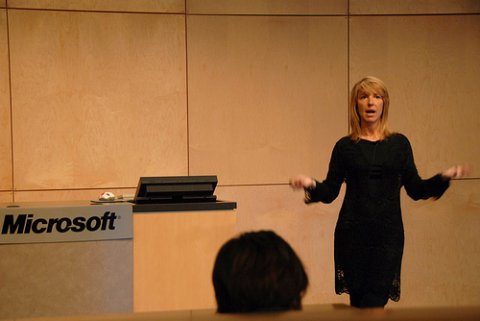Mich Mathews is the former SVP and CMO of Microsoft. While at Microsoft, Mathews oversaw a multi-billion marketing spend and over 7,000 marketers. She retired from Microsoft after 22 years with the company in 2011. Mathews now spends her time Angel Investing, and sits on the Digital Advisory Board of Unilever and the Boards of Oanda, True [x] and Bitium. She also starts teaching at Annenberg in the fall. Mathews visited an Annenberg M{2e} undergraduate communication seminar in April and joined Katelyn Foley for a conversation soon thereafter.
Marketing 101 – What is marketing?
Marketing is figuring out what a customer wants and how to sell it to them. It’s part art and part science. And on occasion, part gut. Once you’ve figured out what you are going to offer that customer you need to find the most effective and efficient way to get the product to them, and then how to retain them as a customer so they keep returning for more.
What were the biggest challenges you faced as a CMO?
Microsoft was, and still remains a large matrixed company. Its products are used everywhere around the globe so I’d have to orchestrate campaigns that literally had to reach over a billion people at any one time. It’s a lot of products, people and strategies to keep running on time and being effective. I would say I was often on the lunatic fringe of multi-tasking.
How do you think about media mix today?
Architecting a plan today you look at the framework of earned, shared, owned and paid With the endless new media proliferation, you don’t need a large paid media budget anymore to build awareness of your brand. Earned and shared can be massively effective.
That said, a staggering 70bn is going to be spent in the coming year on TV. If you need to build a brand at scale and change a perception or spike awareness greatly, the reach of TV is still very powerful. But in my view, only when it’s during live sports, breaking news or a highly popular show. And the demand to own those specific forums are in scarce supply, as a result marketers are forced to buy other less effective content in order to garner access to the coveted time sensitive slots.
As we’ve seen in the last five years, digital media is seeing massive growth, particularly in mobile - those numbers are going through the roof. The great news is that we’re only going to see more innovation in this space. New formats and approaches are going to be pioneered that will undoubtedly accelerate the move of ad dollars from traditional into digital.
From the established online platforms out there – Facebook, Twitter, AOL, Yahoo!, Google, etc. – who will capture the lion’s share of online ad spend?
The reality is that something like 41% of digital dollars today are already going to one company, Google. There is no question that search drives incredible ROI for marketers. So there is definitely one player who dominates.
What trends are you seeing in the ad agency world?
It’s wonderful to see the number of smaller shops emerging that aren’t being defined as a creative shop, a social shop, a media shop, etc. They are executing campaigns left to right, starting with earned and then only integrating paid if it makes sense. That is a much different model than how the traditional holding companies largely operate today.
I know of a few larger brands pretty frustrated at the level of internal integration they have to do across their roster of agencies. So sooner or later a smart agency is going to capitalize on that pain and reinvent itself as a fully integrated vendor across all of the marketing disciplines. It’s a huge opportunity for whoever nails it.
The other fascinating trend is brands becoming media companies. Obviously Red Bull is the Olympiad at this, but many of the packaged goods companies are also doing really great content work to drive their business.

It’s not so rigid. People are now interacting with brands in so many different places that it gives a brand permission to dimensionalize its personality or values very explicitly. People expect them, let’s say, to have a sense of humor, a serious side, a bit of a swagger, etc. It is the CMO’s job to steward this and know when to throttle down or throttle up, take a risk and so on. No small responsibility, certainly an art to doing it well.
What is the best advice you received from Bill Gates?
No single thing springs to mind but he did teach me the importance of taking a long-term approach to most things in business and life. Do your research, study the customer, the market and the competition. Carve your strategy and stay focused on that for the long term.
What are your most important pieces of career advice?
I think there are three things you need to figure out and the sooner you do that, the sooner your career will take off. (1) what are the things you are already good at, (2) what are the things that are going to be lifelong work for you, you’ll never ace, but you’ll get a solid “B” (3) and what are the things that are true weaknesses that honestly, just give up on them as you’re never going to be that person. Once you know these things, you always take jobs about #1 as you will shine, and you will be happy. When you seek out development and training opportunities, you should focus on #2. Mentors you select should have qualities that assist you with #2. And lastly never take a job that is about anything in category #3. Instead make sure you pick lieutenants who are geniuses in #3 so they can compensate for your weaknesses.







